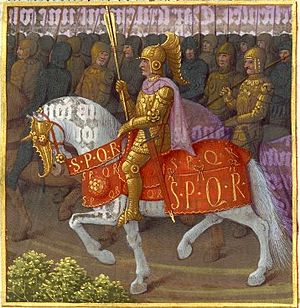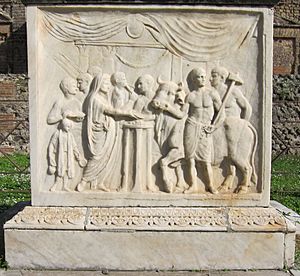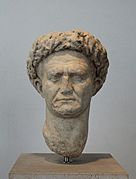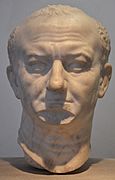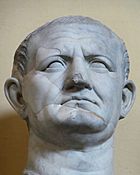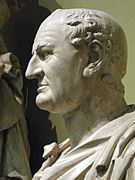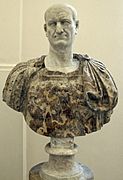Vespasian facts for kids
Quick facts for kids Vespasian |
|||||||||
|---|---|---|---|---|---|---|---|---|---|
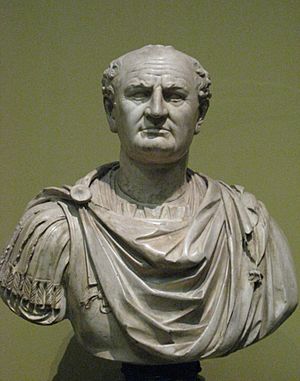 |
|||||||||
| Roman emperor | |||||||||
| Reign | 1 July 69 – 23 June 79 | ||||||||
| Predecessor | Vitellius | ||||||||
| Successor | Titus | ||||||||
| Born | Titus Flavius Vespasianus 17 November 9 AD Falacrinum, Italy |
||||||||
| Died | 23 June 79 (aged 69) Aquae Cutiliae |
||||||||
| Burial | Rome | ||||||||
| Spouse |
|
||||||||
| Issue Detail |
|||||||||
|
|||||||||
| Dynasty | Flavian | ||||||||
| Father | Titus Flavius Sabinus | ||||||||
| Mother | Vespasia Polla | ||||||||
Vespasian (born Titus Flavius Vespasianus on November 17, AD 9 – June 23, 79) was a powerful Roman emperor. He ruled the Roman Empire from AD 69 to 79. Vespasian was the fourth and final emperor during a chaotic time known as the Year of the Four Emperors. He started the Flavian dynasty, a family line that ruled Rome for 27 years.
Vespasian brought back stability to the Roman Empire. He made important changes to Rome's money system. He also started many huge building projects, like the famous Colosseum. His strong leadership helped the empire become peaceful and well-organized again.
Vespasian was the first emperor to come from an equestrian family. This meant his family was wealthy but not part of the highest noble class. He worked his way up to become a senator. Vespasian became famous for his military victories. He led a Roman legion during the invasion of Britain in AD 43. Later, he took control of Judaea during a major Jewish rebellion in AD 66.
While Vespasian was fighting in Judaea, Emperor Nero died. This led to a year of civil war in Rome. After two emperors, Galba and Otho, died quickly, Vitellius became emperor. But the Roman armies in Egypt and Judaea chose Vespasian as their emperor on July 1, 69. Vespasian then worked with other generals to take power. He left his son Titus to finish the fight in Jerusalem. Vespasian took control of Egypt, which was important for Rome's food supply. On December 20, 69, Vitellius was defeated. The next day, the Senate officially declared Vespasian emperor.
Vespasian's ten-year rule brought many improvements. He fixed Rome's money problems after the war in Judaea. He started many building projects, including the Colosseum. He also expanded the empire in Britain through his general Agricola. Vespasian is remembered for bringing peace and order back to Rome. When he died in 79, his oldest son Titus became emperor. This made Vespasian the first Roman emperor to be followed by his own son.
Contents
Vespasian's Early Life
Vespasian was born Titus Flavius Vespasianus in a village called Falacrinae, northeast of Rome. His family was not famous or from a very old noble line. His father, Titus Flavius Sabinus, was a Roman moneylender and tax collector. His mother, Vespasia Polla, also came from the equestrian class. Her father had been a high-ranking military officer. Her brother became a Senator.
Vespasian grew up in the countryside, near Cosa, in Italy. He was raised by his grandmother. Even as emperor, he often visited his childhood home. He kept his old family villa exactly as it was.
At first, Vespasian was not as successful as his older brother, Titus Flavius Sabinus. His brother had a more important military job. Vespasian served in the army in Thrace in AD 36. The next year, he became a quaestor (a financial officer). He then worked in Creta et Cyrenaica. He slowly moved up the ladder of Roman public jobs. He became an aedile (in charge of public works) in 39. Then he became a praetor (a judge) in 40. He used this chance to get close to Emperor Caligula.
Vespasian's Military and Political Journey
Starting His Career
To become a praetor, Vespasian needed to serve in two minor government jobs. One was military, and the other was public. He served in the military in Thracia for about three years. When he returned to Rome around AD 30, he got a job cleaning streets. His early work was not very good. Emperor Caligula reportedly even put dirt in his toga to show how dirty the streets were.
Vespasian did not have much political power or family connections. So, he served as a quaestor in Crete, a province far from Rome. He then tried to become an aedile but failed the first time. He succeeded on his second try in 38. He became a praetor in 39 or 40, at the youngest age allowed (30). This was a time of big changes in how elections were run. His long-term relationship with Antonia Caenis, a trusted secretary to the Emperor's grandmother, may have helped him.
Conquering Britain
When Claudius became emperor in 41, Vespasian was made a legate (commander) of Legio II Augusta. This was thanks to the influence of Tiberius Claudius Narcissus, an important freedman. In 43, Vespasian and his legion joined the Roman invasion of Britain. He showed great skill under the main commander, Aulus Plautius.
After important battles on the Medway and Thames rivers, Vespasian was sent to conquer the southwest of Britain. He moved through areas that are now Hampshire, Wiltshire, Dorset, Somerset, Devon, and Cornwall. His goals were likely to secure ports and mines for tin and silver.
Vespasian marched from Noviomagus Reginorum (Chichester) to defeat the Durotriges and Dumnonii tribes. He captured twenty oppida (towns or hill forts), including Hod Hill and Maiden Castle. He also invaded Vectis (now the Isle of Wight). He set up a fortress and legionary base at Isca Dumnoniorum (Exeter). These successes earned him special honors when he returned to Rome.
Later Political Roles
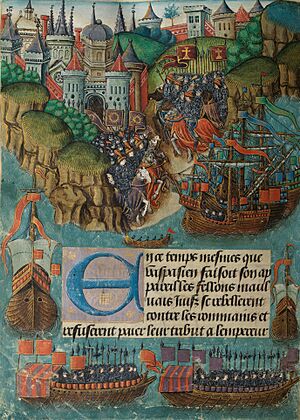
His success as a legion commander led him to become a consul in 51. After this, he left public life for a while. He had upset Agrippina, Emperor Claudius's powerful wife. He returned to public service in 63 as governor of Africa Province. Some historians say his rule there was "infamous," while others say he was "upright and highly honorable." One story says people threw turnips at him!
Vespasian used his time in North Africa wisely. Governors often used their positions to get rich. But Vespasian focused on making friends instead of money. This proved to be much more valuable later on. He faced money problems during this time and had to mortgage his lands to his brother. To earn money, he started trading mules, which earned him the nickname mulio (muleteer).
After Africa, Vespasian traveled with Emperor Nero in Greece. But he lost the emperor's favor. He reportedly fell asleep during one of Nero's musical performances. This put him in a difficult political spot.
The Jewish-Roman War
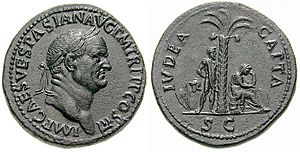
In AD 66, Vespasian was chosen to stop a Jewish revolt in Judea. The fighting had been very bad, and previous Roman leaders had failed. Two legions, with cavalry and other soldiers, were sent under Vespasian's command. His older son, Titus, also arrived with more troops.
During this war, Vespasian met Flavius Josephus, a Jewish leader who was captured. Josephus later wrote about his people's history in Greek. Thousands of Jews were killed, and many towns were destroyed as the Romans took back control. Jerusalem was captured in 70 AD. Josephus, writing as a Roman citizen, described Vespasian as a fair and kind leader.
Josephus also wrote about a prophecy. It said that around the time Jerusalem would fall, a man from their own nation would rule the world. Josephus believed this prophecy was about Vespasian becoming emperor in Judaea.
The Year of the Four Emperors (AD 69)
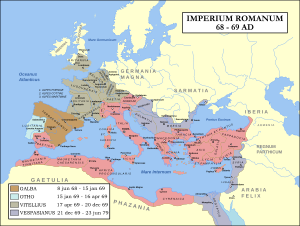
After Emperor Nero died in 68, Rome went through a year of civil war. Several emperors ruled for short periods. Galba was killed by supporters of Otho, who was then defeated by Vitellius. Otho's supporters then looked for a new leader and chose Vespasian. Stories spread in the East that future rulers of the world would come from Judaea. Vespasian began to believe this prophecy was about him.
Vespasian and Titus decided to challenge for the throne in February 69. But they waited until later in the year. Vespasian met often with generals from the East. Gaius Licinius Mucianus, the governor of Syria, was a key ally. In May 69, Mucianus urged Vespasian to challenge Vitellius. Vespasian was officially declared emperor in early July. The armies in Egypt and Judaea swore loyalty to him. Soon after, armies in Syria, Moesia, Pannonia, and Illyricum also declared their support. This made Vespasian the leader of half the Roman world.
While Vespasian was in Egypt securing its grain supply, his troops entered Italy. They were led by Marcus Antonius Primus. They defeated Vitellius's army and marched on Rome. Vitellius tried to make peace, but his guards forced him to stay emperor. After fierce fighting, Vespasian's army entered Rome. The Capitol was burned, and Vespasian's brother was killed.
In Alexandria, when Vespasian heard about Vitellius's defeat, he immediately sent grain to Rome. He also promised to reverse some of Nero's unpopular laws. While in Egypt, he visited the Temple of Serapis. He reportedly had a vision there. Two workers also believed he had a divine power to work miracles.
The governor of Egypt, Tiberius Julius Alexander, declared Vespasian emperor in Alexandria on July 1, 69 AD. Egypt's grain harvest was vital for Rome. This helped Vespasian gain control over the entire empire. Vespasian was the first emperor since Augustus to visit Egypt. He was welcomed as a pharaoh and seen as a son of the god Amun.
Emperor Vespasian (69–79 AD)
After the Civil War
The Senate declared Vespasian emperor on December 21, 69, while he was still in Egypt. For a short time, Mucianus managed the empire with help from Vespasian's son, Domitian. Mucianus began Vespasian's rule with tax reforms to fix Rome's money problems. After Vespasian arrived in Rome in mid-70, Mucianus kept pushing him to collect as many taxes as possible.
Vespasian and Mucianus brought back old taxes and created new ones. They increased the taxes on provinces and watched the treasury carefully. The Latin proverb Pecunia non olet ("Money does not stink") might have come from Vespasian. He introduced a urine tax on public toilets. This tax had been used before by Emperor Nero but was removed. Vespasian brought it back around 70 AD to raise money.
His son, Titus, did not like this tax. Historians Dio Cassius and Suetonius wrote about it. When Titus complained about the urine tax, Vespasian held up some money from it. He asked Titus if it smelled. Titus said no. Vespasian replied, "And yet, it is derived from urine." Since then, the phrase "Money does not stink" has been used to describe money, no matter how it was earned.
In early 70, Vespasian was still in Egypt. His trip to Rome was delayed, possibly by bad weather. Some historians think he was gathering more support from Egyptians before leaving. Stories of a divine Vespasian healing people spread in Egypt. During this time, protests broke out in Alexandria over his new taxes. Grain shipments were also delayed. Vespasian eventually restored order, and grain shipments to Rome continued.
Besides the unrest in Egypt, civil war continued in other parts of the empire in 70. Judaea had been rebelling since 66. Vespasian's son, Titus, finally ended the rebellion. He captured Jerusalem and destroyed the Jewish Temple in 70.
In January 70, another uprising happened in Gaul and Germany. This was called the second Batavian Rebellion. It was led by Gaius Julius Civilis and Julius Sabinus. Sabinus claimed he was related to Julius Caesar and declared himself Emperor of Gaul. The rebellion defeated two Roman legions. But Vespasian's son-in-law, Quintus Petillius Cerialis, put it down by the end of 70.
Arriving in Rome and Gaining Support
In mid-70, Vespasian finally arrived in Rome. He immediately worked to stay in power and prevent future revolts. He gave gifts to many soldiers and the public. Soldiers loyal to Vitellius were removed or punished. Vespasian also reorganized the Senate and the equestrian class. He removed his enemies and added his allies. He also took away some self-rule from Greek provinces. Vespasian made strong efforts to control how people saw his rule.
How Vespasian Used Propaganda
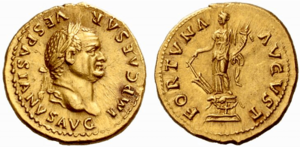
Historians say that Vespasian, as a new emperor, needed more public support and respect. Many modern historians note how much propaganda was used during his rule. A key part of this was showing his victory in Judaea as a sign that he was meant to rule. Stories of a supernatural emperor who was destined to rule spread throughout the empire.
Almost one-third of all coins made in Rome under Vespasian celebrated military victory or peace. Construction projects had inscriptions praising Vespasian and criticizing earlier emperors. A temple of peace was built in the forum. Vespasian also approved histories written during his reign. This made sure that any negative views of him were removed.
Vespasian also gave money to writers. Ancient historians like Tacitus, Suetonius, and Josephus wrote very positively about Vespasian. They also criticized the emperors before him. Tacitus admitted that Vespasian helped him rise in status. Josephus saw Vespasian as a helper and savior. Pliny the Elder dedicated his Natural Histories to Vespasian's son, Titus.
Those who spoke against Vespasian were punished. Some philosophers were accused of teaching bad ideas and were sent away from Rome. Helvidius Priscus, a philosopher who supported the Roman Republic, was executed for his teachings. Many other writers had their works taken, destroyed, or criticized for being too negative about Vespasian's rule.
Building Projects and Plots
Much of Vespasian's rule between 71 and 79 is not well known. Historians report that he ordered the building of several structures in Rome. He also survived several plots against him. Vespasian helped rebuild Rome after the civil war. He added the Temple of Peace and a temple to the deified Claudius. In 75, he put up a huge statue of Apollo. He also started building the Colosseum. He used money from the treasures taken from the Jewish Temple after the Siege of Jerusalem. Suetonius claimed that Vespasian faced "constant conspiracies." Only one plot is known specifically. In 78 or 79, Eprius Marcellus and Aulus Caecina Alienus tried to kill Vespasian. The reasons for their actions are not known.
Roman Expansion in Britain
Agricola was made commander of the Legio XX Valeria Victrix in Britain. This legion had mutinied against the previous governor. Britain had rebelled during the civil war. Agricola brought back discipline to the legion and helped strengthen Roman rule. In 71, a more aggressive governor, Quintus Petillius Cerialis, replaced the old one. Agricola was able to show his skills as a commander in campaigns against the Brigantes in northern England.
Vespasian's Death
During his ninth year as consul, Vespasian became slightly ill in Campania. He returned to Rome and then went to Aquae Cutiliae, where he spent every summer. However, his illness got worse, and he developed severe diarrhea.
As he felt death coming, he reportedly said, "Vae, puto deus fio." This means, "Dear me, I think I'm becoming a god." He died on June 23, 79 AD. His sons Titus and then Domitian succeeded him as emperor.
Vespasian's Legacy

Vespasian was known for his cleverness and friendly manner. He also had a strong personality and military skill. He was generous to senators and equestrians who were struggling. He also helped cities and towns damaged by natural disasters. He was especially kind to writers and speakers. He gave some of them salaries of up to 1,000 gold pieces a year. Quintilian is said to be the first public teacher to receive this imperial favor. Pliny the Elder's work, the Natural History, was written during Vespasian's rule and dedicated to Vespasian's son, Titus.
Vespasian generally did not trust philosophers. Philosophers often praised the Republic, which worried Vespasian. He brought back old laws against this profession as a precaution. Only Helvidius Priscus was executed after he repeatedly insulted the Emperor. Vespasian had initially tried to ignore him. The philosopher Demetrius was sent away to an island. When Vespasian heard Demetrius was still criticizing him, he sent a message: "You are doing everything to force me to kill you, but I do not slay a barking dog."
According to Suetonius, Vespasian "bore the frank language of his friends, the quips of pleaders, and the impudence of the philosophers with the greatest patience." He was also known for his good deeds for the people. Much money was spent on public works and making Rome beautiful again. This included the Temple of Peace (also called the Forum of Vespasian), new public baths, and the great Colosseum.
Vespasian changed the value of the denarius coin during his rule. He reduced the silver purity from 93.5% to 90%. The silver weight dropped from 2.97 grams to 2.87 grams.
In modern Romance languages, public urinals are sometimes named after him (like vespasiano in Italian). This is probably because of the tax he placed on urine collection. Urine was useful for its ammonia content.
Vespasian's Family Life
His Family Tree
His grandfather, Titus Flavius Petro, was the first in the family to become well-known. He rose to the rank of centurion (a military officer). He fought for Pompey in 48 BC. Later, he became a debt collector. Petro's son, Titus Flavius Sabinus, was a customs official and a small-scale moneylender. He was known as an honest "tax-farmer." Sabinus married Vespasia Polla, who came from a higher social class. Her father had been a high-ranking military officer, and her brother became a Senator.
Sabinus and Vespasia had three children. Their oldest, a girl, died as a baby. The older boy, Titus Flavius Sabinus, entered public life and pursued a political career. Vespasian, on the other hand, seemed less likely to succeed at first. He only pursued high public office because his mother teased him about it.
Marriage and Children
Vespasian married Flavia Domitilla. She was the daughter of Flavius Liberalis. They had two sons, Titus Flavius Vespasianus (born 39) and Titus Flavius Domitianus (born 51). They also had a daughter, Domitilla (born around 45). Both his wife Domitilla and his daughter Domitilla died before Vespasian became Emperor in 69. After his wife died, Vespasian's long-term partner, Antonia Caenis, became his wife in all but official status. This relationship lasted until she died in 75.
Gallery
-
Portrait bust of Vespasian from Ostia, 69–79 AD, Palazzo Massimo alle Terme, Rome
-
Restored original portrait of Vespasian. Vatican Museums, Rome
-
Bust of Vespasian, Pushkin Museum, Moscow
-
Bust of Vespasian, c. 80 AD, Farnese Collection, Naples National Archaeological Museum
Flavian family tree
|
||||||||||||||||||||||||||||||||||||||||||||||||||||||||||||||||||||||||||||||||||||||||||||||||||||||||||||||||||||||||||||||||||||||||||||||||||||||||||||||||||||||||||||||||||||||||||||||||||||||||||||||||||||||||||||||||||||||||||||||||||||||||||||||||||||||||||||||||||||||||||||||||||||||||||||||||||||||||||||||||||||||||||||||||||||||||||||||||||||||||||||||||||||||||||||||||||||||||||||||||||||||||||||||||||||||||||||||||||||||||||||||||||||||||||||||||||||||||||||||||||||||||||||||||||||||||||||||||||||||||||||||||||||||||||||||||||||||||||||||||||||||||||||||||||||||||||||||||||||||||||||||||||||||||||||||||||||||||||||||||||||||||||||||||||||||||||||||||||||||||||||||||||||||||||||||||||||||||||||||||||||||||||||||||||||||||||||||||||||||||||||||||||||||||||||||||||||||||||||||||||||||||||||||||||||||||||||||||||||||||||||||||||||||||||||||||||||||||||||||||||||||||||||||||||||||||||||||||||||||||||||||||||||||||||||||||||||||||||||||
See also
 In Spanish: Vespasiano para niños
In Spanish: Vespasiano para niños
- Stele of Vespasian
- List of Roman emperors
- Pecunia non olet


